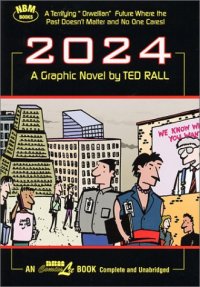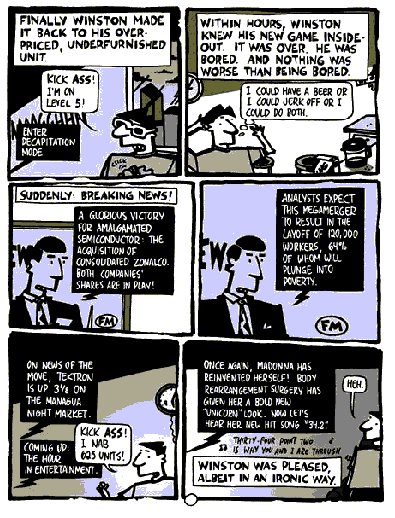“No. Yes. Whatever.”
—Words of wisdom from Ted Rall’s Winston
“Scattered about the city were the three organs of the corporate-government complex: Independent technologies, which owned all the technology companies and licensed new ones. Populist Party headquarters which concerned itself with stifling independent thought. Freedom media enterprises, a multinational that owned and censored the press, radio and web tv.”
—Ted Rall’s replacements for the Ministries of Truth, Love, Information and Plenty in his new book 2024

Surf the net and you’ll be relentlessly buffeted by ideas from George Orwell’s 1984. It’s an important and still relevant book because it gives you a handy dictionary of how the state or any big institution perpetuates lies and falsehoods. Yet how would the Orwellian icons of Ingsoc, Big Brother and the Two Minute Hate look when reinterpreted by today’s reality of the consumer society, the networked world and multinationals more powerful than nations?
Acerbic, brilliant and just plain mean-spirited cartoonist Ted Rall dares to answer that question in his new book 2024. This isn’t so much a sequel to 1984 as a director’s cut that reinterprets the original material. The book features a kind of pop culture overlay, or “updating” as one critic referred to it, placed upon the now familiar Orwellian conceits. Where we once had the evils of the state and a kind of programmed fascistic path, Rall gives us the consumer society and mega corps and an individual who never really questions the machine to begin with. Rall’s Winston never even bothers to start his secret diary at all. He’s too enamored with stock options, the continuous knick-knacks (always at bargain prices) of the Consumer Age and a bit of the ’ol ultra-violent offerings of Web TV. While the concluding truth of Orwell’s Winston Smith was “We are the dead”, Rall’s reconstructed and completely consumer cultured Winston Smith can only spout “Whatever”. Rall’s fascist state doesn’t even need a Big Brother (the one element that’s conspicuous by its absence in 2024) the consumer culture’s mind control is so efficient.
This isn’t the first time this sort of thing has been done. Anthony Burgess gave us a bizarre sequel to 1984 called 1985 (reviewed by none other than Martin Amis in a bit of weird Brit lit synergy), which was half-novel, half critique to hear Amis describe it. And Terry Gilliam’s film Brazil feels a lot like 1984, down to the claustrophobic mood of doom and decay filled by British civil servants.
Rall’s version is definitely a rewrite of sorts. All your fave characters are here: O’Brien, Julia, even those fanged rats in a cage although they are brought to you via virtual reality goggles. For example, instead of “War is Peace, Freedom is Slavery, Ignorance is Strength”, we get:
Assumptions Permit Imagination
Knowledge is Impossible
Exploitation is Benevolence
Instead of O’Brien’s seminal work “The Theory and Practice of Oligarchical Collectivism” you get “Why Everything Sucks: The Deconstruction of Neopostmodernism”. Har har I guess. You get the vibe right?

Rall’s Winston still has his job of rewriting history and throwing stuff down the memory hole. But he’s got computer networks and PDAs and broadband to work with as opposed to Orwell’s quaint pneumatic tubes. Subjective reality just isn’t what it used to be once Winston finishes his work. Dead punker Stiv Bators was either a musician or a Nobel Prize winner, thanks to Winston’s work. The 2008 election could have been annulled after Buchanan won because of a third party run by DeBeers—but who knows thanks to the Media Group’s constant rewrites. Family Circus “artist” Bill Keane wins the Pulitzer Prize, again according to Winston. And now that paper is a thing of the past the collective cultural memory proves to be a tad more malleable. That’s the kind of fun and chicanery you can expect at Rall’s Media Group, his extrapolation of Orwell’s Ministry of Truth—a very realistic extrapolation in this Rupert Murdoch/AOL/Microsoft world that we now live in (all companies that have since merged in 2018 to form Rall’s singular company Indietech... Figures).
Does this work as art? Well, I personally enjoyed this work. Ted Rall—along with Tom Tomorrow, Ruben Boling, Aaron McGruder and Liberty Meadows artist Frank Cho right behind them—is one of the better print cartoonists out there. He’s probably in the first rank of political cartoonists, and his rage is never predictable. Though not quite in the Watchmen or Maus range, 2024 is entertaining. But it’s not perfect. For one, even though Rall is a great writer, he’s just a so-so artist. No one would ever confuse his line with Art Spiegelman’s or Cho’s. In the future, he’d probably be better off letting someone else draw, say Bill Sienkiewicz or Kyle Baker on their off days. Two, the sitcom one-liner tone, which kind of works for his shorter editorial cartoons, might not be appropriate for even a reinterpretation of 1984. It’s kind of like Mel Brooks doing 1984. Sure, it would be a laff riot but it changes the tone of the work into something different, and not necessarily better. Woody Allen could probably pull off an entertaining laff riot version of 1984 that was thoughtful and funny, but you could argue that he already did that with Sleeper, with its Orgasmatrons, butler droids and cloned noses...
The final concern has to do with the same kinds of perception problems that the novel had to deal with and that big unanswered question: Was 1984 a novel about the excesses of communism, or capitalist-birthed fascism? If you believe that 1984 was more about the excesses of capitalist society—which I believe, just to betray my own biases—and that Orwell’s idea of the War Machine is a precursor to the Military Industrial Complex of C. Wright Mills fame, then Rall’s take is for you. If you believe that Orwell was writing about those evil commies, then you might miss the point of a world where there’s just one media company, one tech company, and one party. I definitely recommend it for all Orwell and Rall fans. I’m not sure if it works entirely as art, but it’s politics and its speculation seem to be on target, which is what made 1984 great to begin with.

If you’re as obsessed about Orwell as I am, then you might want to pick up the comic Orwell biography called Orwell for Beginners, published by Writers and Readers. I learned all kinds of things about how his ideas developed, his personal history, and what a courageous figure he was. The big insight I gleaned was into the question that has confused many people about whether he hates capitalism or communism. Answer: He clearly hates everybody, and has very good first-hand reasons for doing so! He hates capitalism because he lived as a starving writer in both France and England and wrote about the darkside of capitalism firsthand. He’s also witness to the darkside of imperialism when he lived in India, where he works as a cop. I never would have figured Orwell, or Eric Blair as he was truly called, to be a cop. (There has to be a movie there somewhere, set in India, with Blair—played by Liam Neeson—as the very cynical cop, investigating murders and corruption; practically writes itself...)
He hates the commies because even though he technically fought with them during the Spanish civil war, the forces of democracy were sold out because of odd and despicable tactical positioning on the part of Stalin. This results in the forces of democracy being starved and a lot of Orwell’s friends being dead. Thus, begins his long hatred of Soviet style politics. Like I told you: Hates Everybody.
Does it work as art, he asks again? Well, it's not really cohesive in that McCloud or Eisner way. It kind of feels like text ‘n pictures thrown together. But it’s still a satisfying read, almost must-reading for all Eric Blair fans. I have to confess I enjoyed it more than the Rall parody.
Odds N’ Ends: As a follow-up to my earlier review of the A.I. websites, let me join the masses who thought that those websites offered a more compelling story than the film A.I.. One of the things that the film missed or didn’t envision is that the AIs didn’t all smile while you poured acid down their throats. In the story the websites tell, some of the A.I.s fight back and fight back effectively. The story on the sites was also much broader and not based on what I thought was the flawed premise of the film: the machine who just wants to be loved. Hey ’droid I’ve got news for you: the blue fairy doesn’t give that to most people, why would it give it to you? I just didn’t think it was a very interesting question or an interesting film, which shocked me. I can’t ever remember being so disappointed by a Spielberg film. In the future, maybe they’ll be a show on the telly and if so they should base it on the A.I. sites, which gave me a much broader sense of the A.I. world than the movie did. This does not bode well for Minority Report.
Also: congratulations to Alan Moore for his recent Eisner scripting wins for Promethea. Don’t forget to pick up the newest issue of Promethea, 15, by the way. This is Moore at his best, comparable to Watchmen and definitely better drawn.



